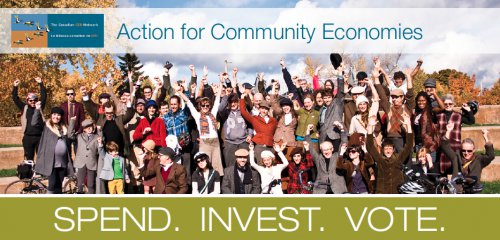Elections are natural times to think about the future. What kind of Canada do we want? What issues are most important? What kind of change is possible?

But what if the deluge of issues was actually a symptom of some more profound systemic problems? What if dealing with them in isolation won’t change the dynamics that created them in the first place?
Don’t get me wrong — treating symptoms is essential. But if we don’t also address causes, we may never get off our hamster wheel.
Many of the frustrations with government responses to these issues are rooted in the siloed structures and jurisdictional walls that were created long ago. They are the legacy of a way of thinking about the world that focuses more on differences and separateness than connections.
Today, it’s obvious that the economy is connected to the environment. Public health specialists and epidemiologists know that your health is affected by your income. And businesses are essential to building communities.
For most of us, all of these issues come together where we live, and the economy affects almost every sphere. Taking action to shift the economy on a community level, as part of a move to re-embed our values in the economy is a growing trend. We see it in consumer choices for healthy, local food, the creation of new co-ops and social enterprises, and the move towards community investment and social purchasing opportunities, to name a few.
Thousands of Canadians are building community economies that are more democratic and contribute to positive local economic, social and environmental impacts.
To some, talking about community economies may seem like parochial nostalgia for bygone days. In contrast, Samuel Bowles and Herbert Gintis predict that shifting control to communities is likely to grow in the future. The reason is that the types of problems communities can solve – those which also tend to resist governmental or market solutions – arise when interactions cannot be regulated by contracts or external decisions due to the complexity of the interactions or the private nature of the information involved. As information-intensive team production replaces assembly lines, and the economy shifts from an emphasis on quantities to qualities, the superior governance capabilities of communities are what will facilitate the qualitative interactions underpinning the 21st century economy.
The shift to a community focus is not just practical, it’s also simply a better, fuller way of living. Charles Leadbetter argues that the time has come for a co-operative correction, to shift our cultural centre of gravity. After having become too dependent on explicit rules, formal systems and material incentives, which stifle co-operation, we can now focus on forms of community governance based on relationships and trust, rather than systems and rules, and approaches to public policy which open up opportunities for co-operation rather than closing them down from the outset.
Co-operation and communities – far from seeming quaint and anachronistic – could come to define the spirit of the times, successful and modern, aspirational and dynamic. Backed by many converging sciences, we now understand more about how to sustain co-operation through fairness, communication, norms and reputation-building. Internet and social media are working in favour of co-operation, amplifying and reinforcing relationships.
For my money, the most fitting label for our current predicament was suggested by evolutionary biologist David Sloan Wilson in a conversation I had with him earlier this year. After working with Nobel Prize winner Elinor Ostrom for many years to generalize the design principles of co-operation in successful groups, he described the opportunity before us as ‘cultural evolution’. It’s a chance to change some old practices that may have worked for a time, but are now outdated.

By strengthening communities and shifting our economies to increase local control, we create opportunities to make a difference across a wide range of issues. These steps to reinvigorating neighbourhood economies can lead the way to a new era of abundance, resilience, and health.
So as you cast your vote in the federal election, consider action for community economies in your choice, as well as in your everyday choices afterwards.
It’s democracy in action.

Michael Toye is the Executive Director of the Canadian CED Network. He has also taught courses on CED and social enterprise at Concordia University and has written a number of articles and other publications on CED and the social economy, including co-editing the book, Community Economic Development: Building for Social Change.
Read Michael’s blogs




